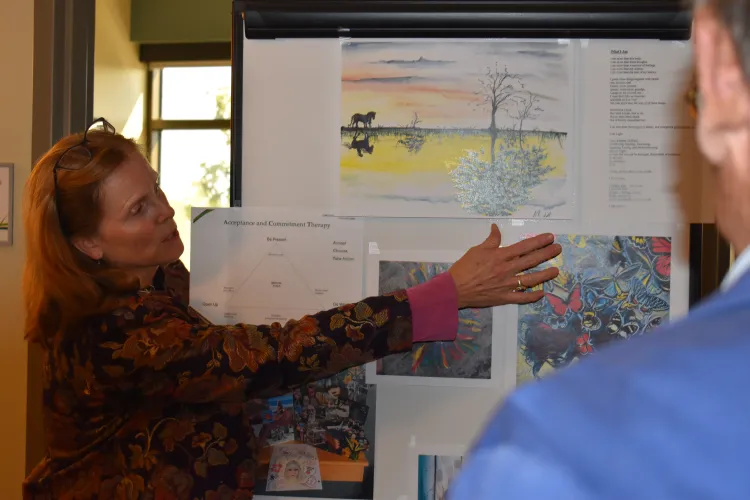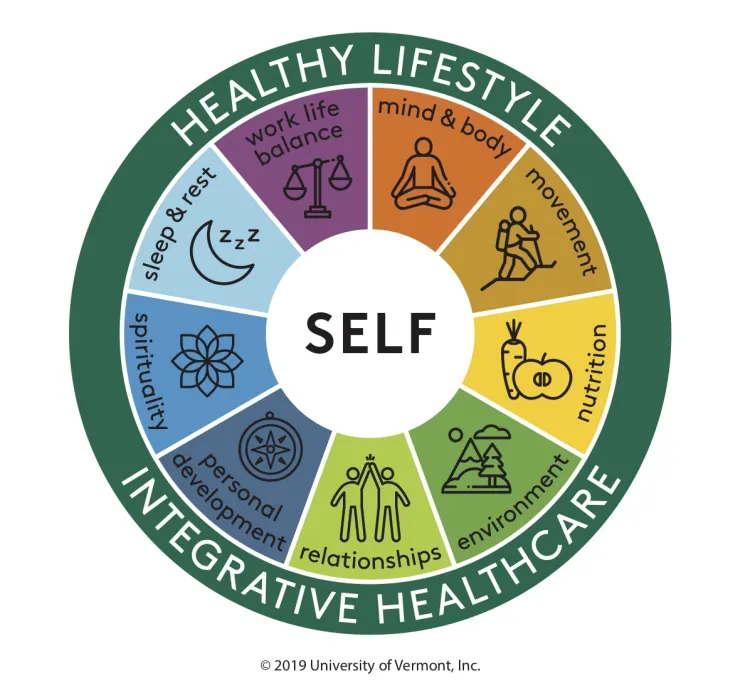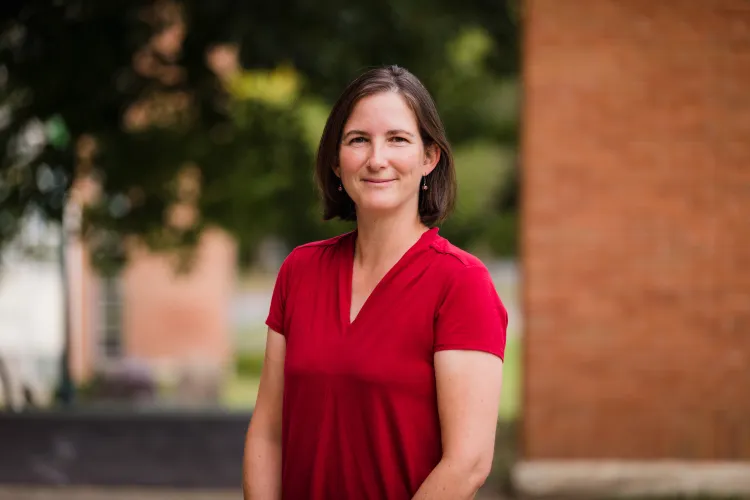In every administrative, programmatic, and organizational capacity one could imagine, the Osher Center for Integrative Health at UVM’s first year has been transformative.
Director Jon Porter, MD, and Associate Director Cara Feldman-Hunt have been busy since the Bernard Osher Foundation awarded UVM a $5.5 million endowment in 2022 to establish the Center. They have worked to establish meaningful initiatives in clinical, research, educational, and policy arenas to further the Center’s mission of recentering our medical system to utilize a whole-person, integrative approach to care.
Porter, Feldman-Hunt, and their team are building on UVM’s already established leadership in the field of integrative health, evidenced by its founding of the Program in Integrative Health (PIH) in 2004. The program was led by Helene Langevin, MD, now Director of the National Centers for Complementary and Integrative Medicine (NCCIH).
"...we need to transform our approach to healthcare in the 21st Century. It is time to fully recognize that our interdependence with one another, and with the natural world, should be part of health discussions in the clinic, throughout communities, and beyond."
– Helene Langevin, Director of the NCCIH.
The Osher Center’s long list of first-year accomplishments belies its young age. It includes launching projects like Farm Shares for Health, which will provide free CSA memberships and education/health coaching for rural and food insecure cancer patients, music therapy enhancements at UVM’s Children’s Hospital, an increase in integrative modalities at the UVM Cancer Center, a focus on equity during the Osher Center’s third Integrative Pain Management Conference, enrichments in educational programs including Health & Wellness Coaching and End-of-Life-Doula Certificates and sharing an array of accessible, expert knowledge through the Laura Mann Integrative Healthcare Lecture Series.
“It’s incredibly gratifying to see such exponential growth,” Feldman-Hunt said, “and at the same time glimpse all the potential. Now that we are a University-wide Center,” she said, “the areas for collaboration are infinite. We are more nimble and able to engage across the disciplines.”
A Case Study Becomes a National First
The designation of the University of Vermont Medical Center’s Comprehensive Pain Program (CPP) as a primary Osher Center clinical site has added important energy and resources to CPP’s clinical and research work. Developed in 2019, in part to address the rising opioid epidemic, CPP offers consultation for individuals with complex challenges involving chronic pain as well as offerings including Partners Aligned in Transformative Healing (PATH) – a 16-week program that aligns modern medicine and evidence-based integrative practices like acupuncture, nutrition, physical therapy, and mindfulness to support the whole person.

PATH participants join a supportive community of staff, clinicians, treatment providers, group session facilitators, and fellow patients to align their health with what matters to them. Led by Osher Center Director and Assistant Professor of Family Medicine Jon Porter, MD, CPP served nearly 7,500 patients this past year and has emerged as a national model. “Our goal,” Porter said, “is to provide an unconditionally supportive care environment that addresses the entire experience of chronic pain.”
“This program is a case study for health care reform,” said Tom Weigel, M.D., Chief Medical Officer at Blue Cross Blue Shield of Vermont. “It takes an innovative approach to patient care and well-being, while lowering a reliance on emergency departments and reducing health care costs.”
Porter underscores the importance of CPP’s and the Osher Center’s work. “We are really working to move the entire healthcare paradigm towards patient-centered care,” he said.
In an important national first – one that can serve as a model for other states - Vermont Medicaid has entered into a pilot program which will enroll subscribers in CPP’s PATH program. To do so, Vermont Medicaid and the University of Vermont Health Network will utilize an innovative bundled payment mechanism modeled after one pioneered by the Network and Blue Cross Blue Shield of Vermont. This program is an important step forward in eliminating disparities in access to effective, integrative care for chronic pain – a key component of the Osher Center’s mission.
Dr. Benjamin Kligler, Executive Director, Office of Patient Centered Care & Cultural Transformation in the Veteran’s Association, put context around CPP’s reputation during his recent Laura Mann Integrative Healthcare Lecture. “Everyone really has their eyes on what you’re doing in Vermont.”
UVM’s membership in the Osher Collaborative for Integrative Health, an international network of eleven institutions—ranging from Harvard and Northwestern to the University of Washington and UC San Francisco (UCSF)—has enabled the University to leverage its distinctive research strengths and leadership in sustainability, along with its dedicated service to its small, rural home state, to model clinical innovations like CPP. At the Osher Collaborative’s annual meeting, held at UCSF in early October, members discussed modeling and scaling CPP on a broader scope because of its efficacy and success.
Turning the Wheel (of Health)
In late August, Senator Patrick Leahy and his wife, Marcelle Leahy, stopped by the Osher Center’s newly renovated building on campus, just south of Main Street, to thank Bernard Osher in person for the lasting positive impacts he is making on human and planetary health. “The Osher Center’s work is helping not only patients,” Senator Leahy told the visiting Mr. Osher, “but also doctors, nurses, healthcare workers, and the UVM community. It is vital.”

They met in the Osher Center’s converted barn, which includes a demonstration kitchen for culinary medicine, offices for faculty and staff, and a large multi-use classroom for Nursing, Physical Therapy, Health Coaching, and other disciplines. There is also a community/treatment room to offer integrative therapies to UVM employees.
The University transitioned UVM Employee Wellness to the Osher Center this year, in order to leverage the benefits of integrative health resources, education, and research to promote healthy lifestyles and lower health risks for the UVM Community. Programs are designed to provide synergistic support across the institution, as evidenced by the UVM Employee Coaching Connection.
During this 12-week, evidence-based health and wellness coaching program, CNHS Integrative Health and Wellness Coaching students and faculty empower UVM employee participants to reframe and enhance their health across nine areas: Nutrition, Movement, Mind & Body, Work-Life Balance, Sleep & Rest, Spirituality, Personal Development, Relationships, and Environment. Centered around the self, these nine areas form the Wheel of Integrative Health.

Osher research teams will utilize the data they collect on this model of experiential teaching and employee wellness to advance integrative health approaches as part of a global conversation. They can then leverage that data to advance policy and engage in initiatives like as creating a culture of compassionate care for healthcare providers.
Senator Leahy also lauded the Osher Center’s work exploring connections between human and environmental health, as UVM Provost and Senior Vice President Patty Prelock gave an overview of Planetary Health research and educational highlights from the past year.
For People and Planet
Infused in the Osher Center’s work is an awareness of the myriad ways human health, the health of other species, the health of our planet, and our healthcare system are intricately linked. In order to advance research, education, and clinical practice that deepens this understanding, the Center has established a Planetary Health arm as an important mission priority.

An urgent approach to this work is necessary as extreme weather events wreak havoc on individuals and communities and climate anxiety is on the rise. Christine Vatovec, PhD, is a Research Assistant Professor in LCOM; Research Affiliate and Lecturer in the Rubenstein School for the Environment and Natural Resources (RSENR); and Gund Institute for the Environment Fellow. She is also the Osher Affiliate leading the Center’s Planetary Health arm.
Vatovec has been awarded a UVM James Jeffords Grant to support Aligning Health Care with Planetary Health: Examining CSA Prescriptions as a Whole Health Intervention and has been presenting across UVM and the region. “If we wish to promote human flourishing for all people,” she said, “we must truly see our interconnectedness and interdependence with the health of the planet—and the whole health approach of integrative health offers the tools that will get us there.” Vatovec hosted a recent Planetary Health panel discussion as part of the Laura Mann Lecture Series.
As the Osher Center for Integrative Health at UVM grows, it will continue to connect with integrative health practitioners and thought leaders across the United States and globe to positively impact health and well-being for all. And, as a key incubator for cross-campus, multi-disciplinary research, clinical practices, and educational programs, it “showcases UVM at its best,” according to Prelock, working in concert with partners to “build a healthier society.” The Osher team is energized by the Center’s first-year accomplishments’ and look to the vital work ahead with excitement and commitment as they carry forward its mission of shifting the healthcare paradigm in advancing whole-person, quality care for all.
